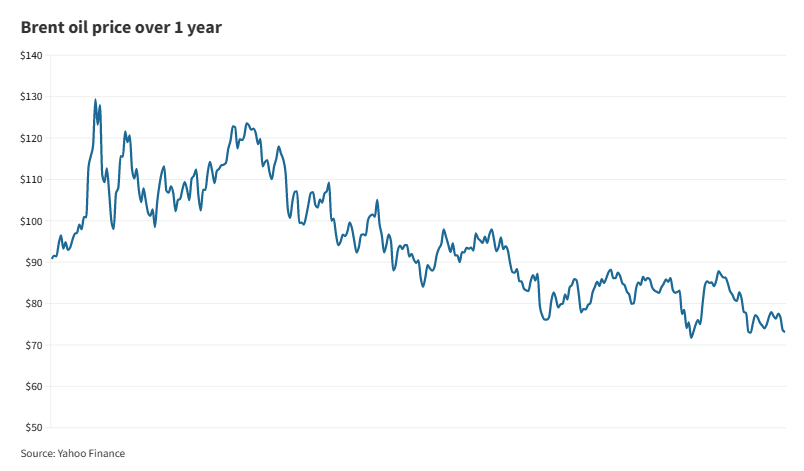章节 1 Jun 1th: Oil Steadies After U.S. House Passes Debt Ceiling Deal to Avoid Default
[U.S. crude stocks, an indicator of crude demand, rose by about 5.2 million barrels last week, according to industry data.]
Oil prices were steady on Thursday after the U.S. House of Representatives passed a bill to raise the nation's $31.4 trillion debt ceiling days before a potential default.
Brent, the benchmark for two thirds of the world's oil, was trading 0.73 per cent higher at $73.13 a barrel at 8.35am UAE time. West Texas Intermediate, the gauge that tracks U.S. crude, was up 0.68 per cent at $68.55 a barrel.
Brent settled 1.2 per cent lower on Wednesday and has lost more than 5 per cent of its value in the last two days amid concerns over the debt deal negotiations and a surprise rise in U.S. crude stocks.
A U.S. default would have sent shock waves across the global financial system and probably triggered a recession, severely denting crude demand.
The U.S. House of Representatives voted 314-117 on Wednesday night in favour of the bill to raise the country's borrowing limit before the June 5 deadline.
"The bill now goes to the Senate where it is expected to pass without incident, coming in just in time before the June 5 deadline when Treasury Secretary Janet Yellen has said the government will run out of money if a deal is not agreed," said Daniel Richards, Mena economist at Emirates NBD.
Investors were also encouraged by positive manufacturing data from China, the world's second-largest economy and top crude importer.
The Caixin/S&P Global manufacturing purchasing managers' index increased to 50.9 in May, from 49.5 in April, above the 50-point mark that separates expansion from contraction.
Manufacturing business conditions in China improved for the first time in three months during May, the survey said.
However, business confidence around the 12-month outlook for output slipped to a seven-month low in May amid concerns over global economic uncertainty, it said.
Meanwhile, economic activity in the U.S., the world's largest oil-consuming nation, is showing signs of slowing down.
The U.S. Federal Reserve said that economic activity was "little changed" overall in April and early May, but expectations for future growth "deteriorated" a little.
"Contacts still largely expected a further expansion in activity … manufacturing activity was flat to up in most districts, and supply chain issues continued to improve," the Fed said in its latest Beige Book, a report on current economic conditions.
"Commercial construction and real estate activity decreased overall, with the office segment continuing to be a weak spot. Outlooks for farm income fell in most districts and energy activity was flat to down amidst lower natural gas prices," the report said.
U.S. WTI prices fell by about 2 per cent on Wednesday as an unexpected increase in U.S. crude stocks – an indicator of crude demand – stoked concerns about excess supply.
The country's oil inventories rose by about 5.2 million barrels last week, according to the American Petroleum Institute.
Analysts polled by Reuters were expecting a drawdown of 1.4 million barrels.
The U.S. Energy Information Administration will release its weekly stock data later Thursday.
Meanwhile, the 23-member OPEC+ alliance is set to meet in Vienna on Sunday to discuss the group's production policy.
On April 2, OPEC+ producers announced voluntary output cuts of 1.16 million barrels per day to ensure oil market stability.
Brent, which crossed $85 a barrel after the group's decision, has since lost about 14 per cent of its value on a weakening global crude demand outlook.
Source: The National News





